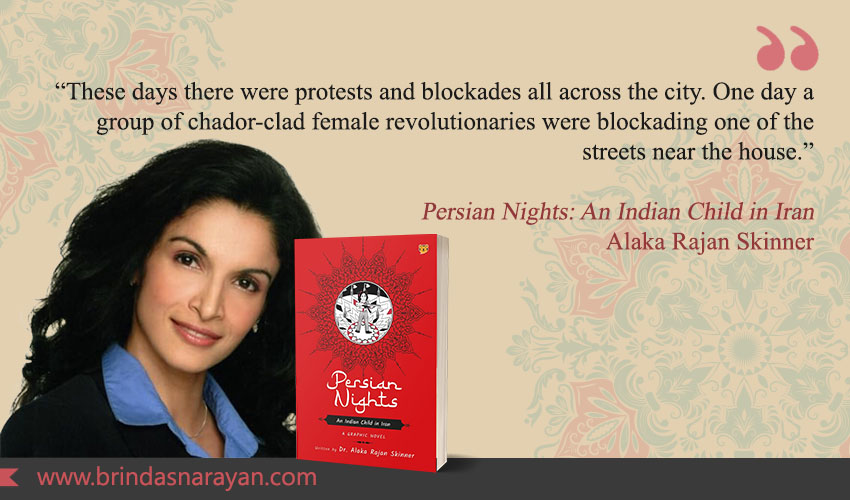
Through the Eyes of a Child: Immigrant Dilemmas Amid Revolution
The first compelling graphic novel I read was Persepolis in which a young Iranian girl grows up through the Islamic revolution. Persian Nights by Alaka Rajan Skinner also brings the revolution into our sights, in a tale peppered with the angst and thrills of an immigrant family. Narrated by a child growing through a tremulous time, it leads us to wonder why history books are rarely written from the viewpoint of teens or children. After all, it’s more personal and poignant when large upheavals are refracted through their somewhat clear-eyed, somewhat muddied visions. And often it takes the little people to call out the absurdities of authoritarian bigwigs and know-it-alls.
Building Cultural Bridges
In this semi-autobiographical graphic novel, an Indian family is thrown into an alien terrain by chance. The young Alaka’s father was teaching at the Central Institute of English and Foreign Languages at Hyderabad and never planned to head to Iran. But Iranian recruiters had arrived at his Institute, and before he knew it, he was roped into an interview and offered a job. His plucky wife was keen on moving.
Alaka and her mother joined the father after the birth of a younger brother. Bracing themselves for foreign encounters and culture shocks, they were heartened to discover the opposite. A plethora of cultural commonalities – like in the food (Iranian pulavs, and Naans, freshly puffed up at a neighborhood bakery), desserts (jalebis and gulab jamuns) and language. The family delighted in discovering familiar words, even if coded in an unfamiliar script. More than anything else, they might have expected hostility or aloofness from locals. They were touched instead by neighborly warmth.
Living on the top floor of an apartment in Tehran, they befriended others in the Indian diaspora, picnicking together or jointly celebrating birthdays. Interestingly, another British traveler to Iran observes that “Iranians are serious, hardcore picnickers.” Though Alaka attended an International Kindergarten initially, later her parents moved her to The Indian School, which employed many Punjabi teachers and staff members. At school they learned Punjabi, Hindi and Farsi (Persian) – the language predominant in Iran.
Watching History in the Making
Landing in Tehran before the Islamic Revolution, at a time when American culture was widespread and popular, and many women wore Western dresses, sleeveless tops and mini-skirts, the family could not have foreseen the impending shifts. Suddenly, Western influences vanished. New cries arose: “Death to America”, “Death to the Shah.” Chador-clad female revolutionaries blocked roads. Alaka and her brother watched revolutionaries wandering streets armed with Molotov cocktails – which they learned for the first time, were flammable bottles corked with rags.
One evening, they watched fires hiss across the city. Her father returned late. The family was nail bitingly worried till he finally arrived. On the streets, an armed revolutionary recognized her father as his Ustaad (or teacher), and shielded him – like in that famed Sound of Music scene – from fellow-revolutionaries. Given how perilous everything seemed, Alaka was sent away to stay with her Mumbai grandparents for a year. When she returned to Tehran, her father got a job at the University of Medical Sciences. But that job also fizzled out in the new environment. They had to leave Iran. They traveled by ship to Baku in Azerbaijan and eventually made their way back to India.
A Glimpse Into Iran’s Past
The Shah of Iran (1941 to 1979) launched the “White Revolution” in 1963 – a program of modernization with elements of tyranny and control. But he underestimated the Islamists, and leaned too heavily towards the Western Bloc, alienating local citizens with a top-down, rapid Americanization while violating human rights and quelling local voices. Ayatollah Khomeini, a philosophy professor, preached against the Shah. When an article critical of him was published, students in Qom protested. In 1978, protests continued. In Jan 1979, the Shah and his family had to leave Iran. Net-net, an old tyranny was supplanted by a new and perhaps even more horrific one.
About the Author
Alaka Rajan Skinner is a writer and executive coach who strongly believes in diversity and empathy. She’s written many books including Are You Listening?, a children’s book that has been featured on BBC radio.
References
Alaka Rajan Skinner, Persian Nights: An Indian Child in Iran, Talking Cub, Speaking Tiger Books, 2024




